Upcoming events.

Bug Club - Liberty Park
When: Friday, August 8, 2025 from 4pm-5pm
Where: Liberty Park (Tracy Aviary parking lot)
Passionate about pollinators?
Join Sageland Collaborative, Utah Pollinator Pursuit, and the Tracy Aviary to learn from community experts and enthusiasts at pollinator hotspots across the Salt Lake Valley!

Bug Club - International Peace Gardens
When: Friday, July 25, 2025 from 4pm-5pm
Where: International Peace Gardens (International Peace Gardens entrance)
Passionate about pollinators?
Join Sageland Collaborative and Utah Pollinator Pursuit to learn from community experts and enthusiasts at pollinator hotspots across the Salt Lake Valley!

Wasatch Wildflower Festival - Alta Ski Area
Held annually, the Wasatch Wildflower Festival is a multi-day event hosted at the four Cottonwood Canyons ski areas to celebrate the beauty and diversity of wildflowers in the Wasatch Mountains. The 2025 Festival will be cohosted with the Brighton Institute at Brighton (in conjunction with Brighton Days) and Solitude. Snowbird Sustainability, Alta Community Enrichment and Alta Environmental Center are cohosting at Snowbird and Alta, respectively.

Wasatch Wildflower Festival - Snowbird Resort
Held annually, the Wasatch Wildflower Festival is a multi-day event hosted at the four Cottonwood Canyons ski areas to celebrate the beauty and diversity of wildflowers in the Wasatch Mountains. The 2025 Festival will be cohosted with the Brighton Institute at Brighton (in conjunction with Brighton Days) and Solitude. Snowbird Sustainability, Alta Community Enrichment and Alta Environmental Center are cohosting at Snowbird and Alta, respectively.

Wasatch Wildflower Festival - Solitude Mountain Resort
Held annually, the Wasatch Wildflower Festival is a multi-day event hosted at the four Cottonwood Canyons ski areas to celebrate the beauty and diversity of wildflowers in the Wasatch Mountains. The 2025 Festival will be cohosted with the Brighton Institute at Brighton (in conjunction with Brighton Days) and Solitude. Snowbird Sustainability, Alta Community Enrichment and Alta Environmental Center are cohosting at Snowbird and Alta, respectively.

Wasatch Wildflower Festival - Brighton Resort
Held annually, the Wasatch Wildflower Festival is a multi-day event hosted at the four Cottonwood Canyons ski areas to celebrate the beauty and diversity of wildflowers in the Wasatch Mountains. The 2025 Festival will be cohosted with the Brighton Institute at Brighton (in conjunction with Brighton Days) and Solitude. Snowbird Sustainability, Alta Community Enrichment and Alta Environmental Center are cohosting at Snowbird and Alta, respectively.
Come say hi at the Sageland Collaborative table on July 12th!

Bug Club - Red Butte Garden
When: Friday, July 11, 2025 from 4pm-5pm
Where: Red Butte Garden (Red Butte Garden entrance)
Passionate about pollinators?
Join Sageland Collaborative, Utah Pollinator Pursuit and Red Butte Garden to learn from community experts and enthusiasts at pollinator hotspots across the Salt Lake Valley!
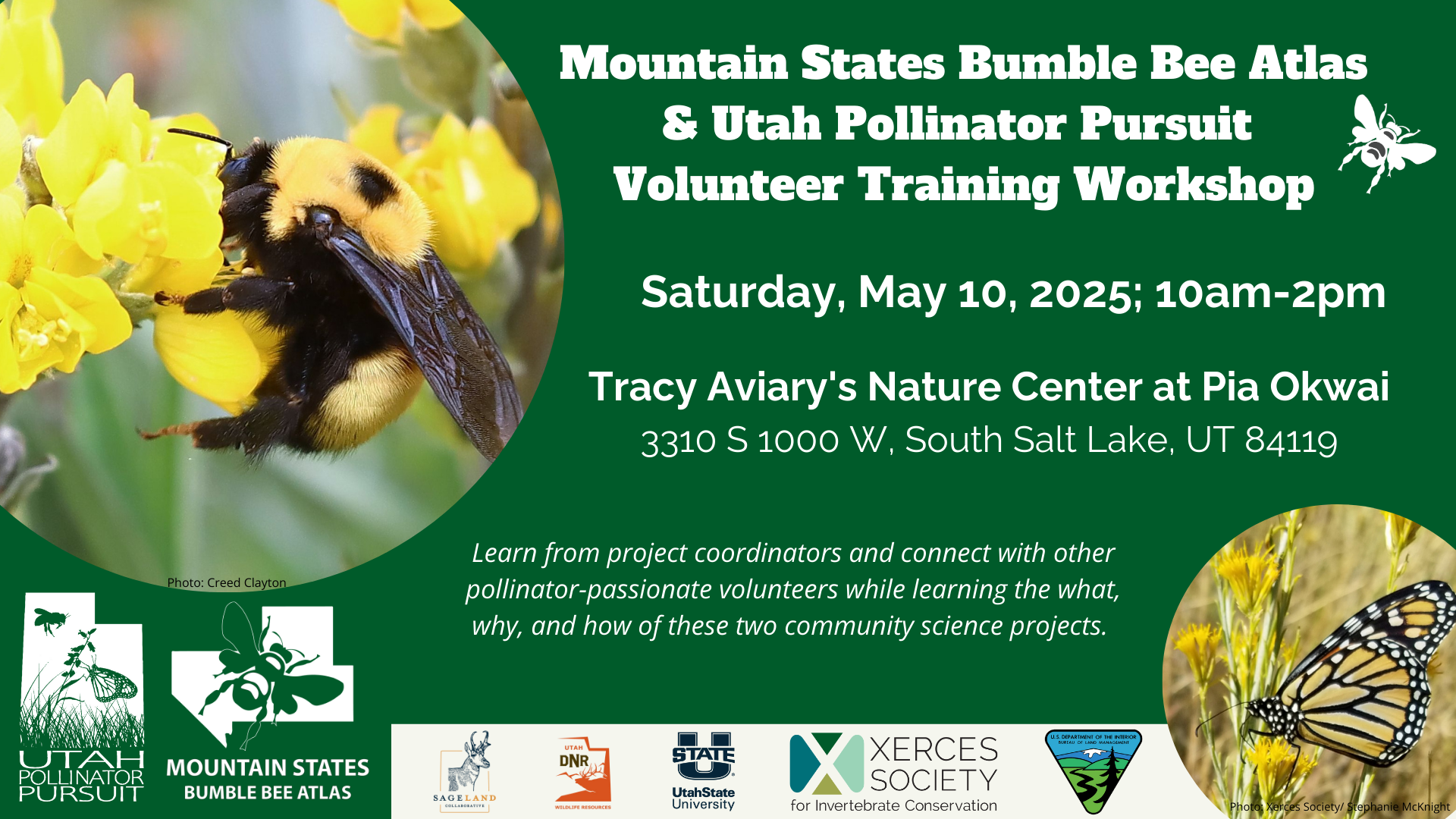
Utah Pollinator Pursuit & Mountain States Bumble Bee Atlas Volunteer Training Workshop
We are thrilled to be bringing Utah Pollinator Pursuit and the Mountain States Bumble Bee Atlas together for a joint training this spring!
Learn from project coordinators and connect with fellow pollinator enthusiasts while learning the what, why, and how of these two community science projects.
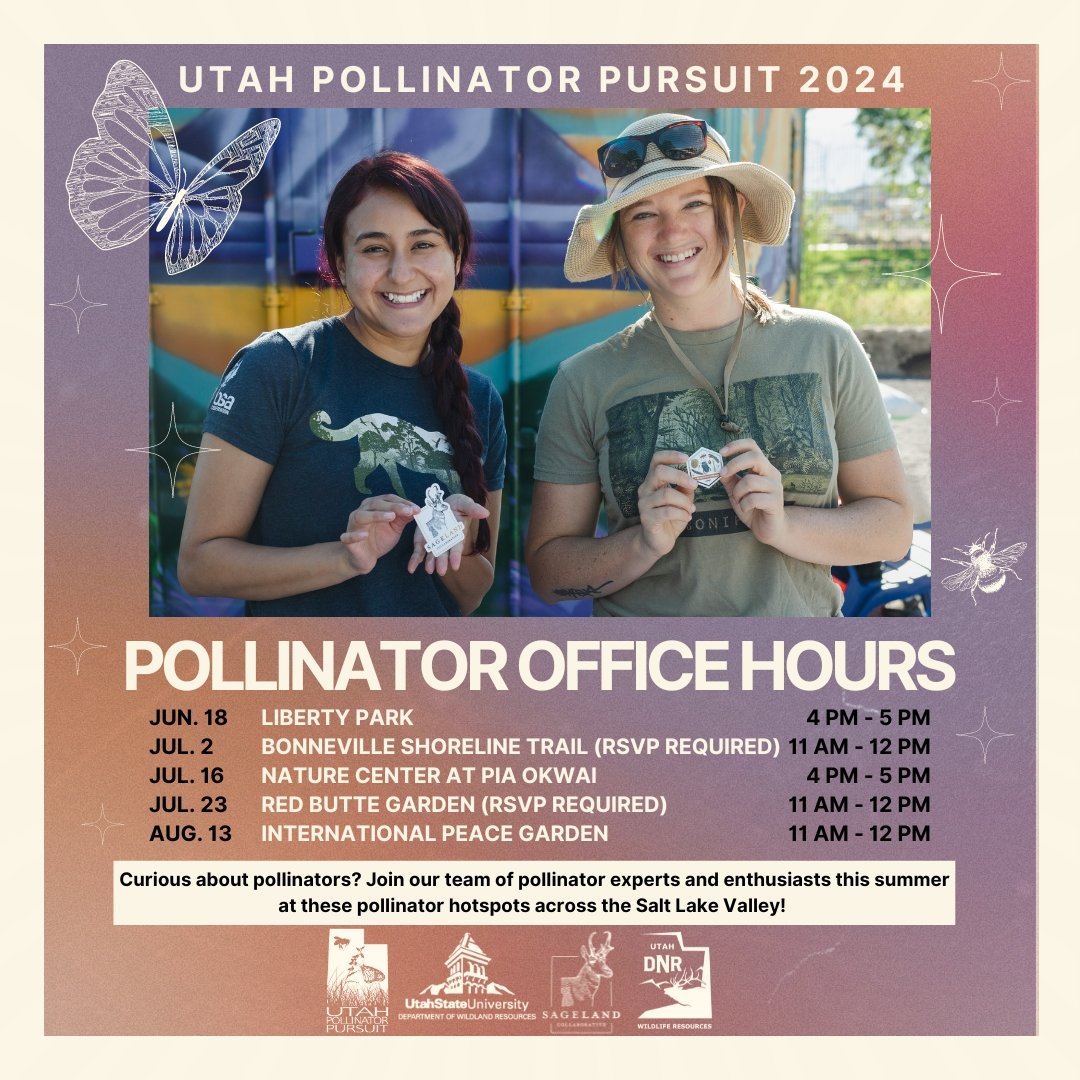
Pollinator Office Hours - International Peace Gardens
Are you curious about pollinators? Interested in participating in conservation efforts here in Utah? Unsure how to get started?
Introducing - Pollinator Office Hours!
During these events, our pollinator experts and enthusiasts will be located at pollinator hotspots across the Salt Lake Valley for anyone who wants to stop by and learn about pollinators. These are safe spaces to connect with our team, get up close and personal with the pollinators, and enjoy a relaxing moment in nature. Pollinator Office Hours are free and provide the opportunity to get your pollinator questions answered and a chance to learn how to log your observations in iNaturalist.
Nuestros expertos en polinización también hablan español para aquellos que necesiten traducción.
We will have a table set up at the entrance to the International Peace Gardens - stop by anytime between 11am - 12pm to chat and engage in pollinator conservation!

Pollinator Office Hours - Red Butte Gardens
Are you curious about pollinators? Interested in participating in conservation efforts here in Utah? Unsure how to get started?
Introducing - Pollinator Office Hours!
During these events, our pollinator experts and enthusiasts will be located at pollinator hotspots across the Salt Lake Valley for anyone who wants to stop by and learn about pollinators. These are safe spaces to connect with our team, get up close and personal with the pollinators, and enjoy a relaxing moment in nature. Pollinator Office Hours are free and provide the opportunity to get your pollinator questions answered and a chance to learn how to log your observations in iNaturalist.
Nuestros expertos en polinización también hablan español para aquellos que necesiten traducción.
This Office Hours will include a leisurely walk through Red Butte Gardens’ Water Conservation Garden where we will observe how pollinators utilize native and waterwise landscaping.
Spots are limited to 10 attendees - please RSVP below.
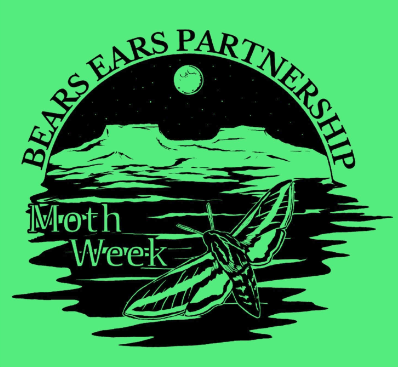
Moth Week 2024
Join Bears Ears Partnership's first annual week of volunteering in honor of National Moth Week, with support from Utah Pollinator Pursuit! Be part of this important effort to observe and celebrate the local moths that support the wider Bears Ears ecosystem and Colorado Plateau. About 500 moth species have been identified in Utah, but this is likely an underestimation. Because of their diverse sizes, camouflaged patterns, and nocturnal behaviors, many moths are very difficult to study and monitor. When you join Community Science initiatives like Moth Week, you’re contributing crucial data to better understand moths and the health of the wider Bears Ears ecosystem.
Anyone can participate in the Community Science Moth Count! You can participate from your own backyard, or join Volunteer Manager Ricky Begaye out in the field at a number of sites. Remember to always practice Visit With Respect guidelines when you are doing Community Science.
Watch the webinar below to learn more about moth ecology and why moth counts are important. This webinar took place on July 20 with Amanda Barth, Rare Insect Conservation Project Leader at Utah State University and Utah Pollinator Pursuit, and Ricky Begaye.
To attend on-site data collection:
1. Fill out the registration below
2. Fill out the Waiver form
3. Sign the photo release form
4. Contact Ricky (ricky@bearsearspartnership.org) if you want to carpool to the location.
5. Join Ricky out in the field at designated sites! Ricky will be setting up starting around dusk, going until 10:30/11:30pm. Locations will depend on weather.
Thursday 7/18: Pack Creek Picnic Area
Saturday 7/20: Valley of the Gods
Sunday 7/21: Upper and Lower Butler Wash
Monday 7/22: Bears Ears Buttes
Tuesday 7/23: Pine Ridge on Abajo Mountain
Wednesday 7/24: Needles District View Area on Abajo Mountain
Thursday 7/25: Rock Castle Campground
Friday 7/26: Needles Overlook
To collect moth data:
1. Wait till dusk, set up a light source, and wait for them to land. You'll also want to set up a landing pad, like an old bedsheet. You can use your porch light and they’ll land on the side of your house. If you’re out in the field, you can tie a rope between two trees to hang a bedsheet.
2. Take photos of the moths, and identify them. You can use a free online resource. Record the location, quantity, type of species, date, and time.
3. Submit the data to this iNaturalist page (if the data is from within Colorado Plateau) - you’ll need to create a free account. https://www.inaturalist.org/projects/national-moth-week-2024-southeastern-utah
4. Share your experience with BEP! If your data is from outside the Colorado Plateau, or if it’s within and you want to share your data with BEP, you can also submit your photos and data to Ricky at ricky@bearsearspartnership.org. The subject line should include the Moth Type, Location, Date/Time. You are also encouraged to send us any photos from behind the scenes of your time collecting data! (By emailing us, you agree to letting us use these photos on in our communications. Let us know if you do not want us to use your photos for promotional purposes.)
Visit Utah Pollinator Pursuit to learn more about pollinator conservation and community science: https://www.utahpollinatorpursuit.org/
Questions? Contact Volunteer Manager Ricky Begaye at ricky@bearsearspartnership.org.
Art by Kai Standy Manuelito

Pollinator Office Hours - Nature Center at Pia Okwai
Are you curious about pollinators? Interested in participating in conservation efforts here in Utah? Unsure how to get started?
Introducing - Pollinator Office Hours!
During these events, our pollinator experts and enthusiasts will be located at pollinator hotspots across the Salt Lake Valley for anyone who wants to stop by and learn about pollinators. These are safe spaces to connect with our team, get up close and personal with the pollinators, and enjoy a relaxing moment in nature. Pollinator Office Hours are free and provide the opportunity to get your pollinator questions answered and a chance to learn how to log your observations in iNaturalist.
Nuestros expertos en polinización también hablan español para aquellos que necesiten traducción.
We will have a table setup on the Nature Center deck - stop by anytime between 4pm - 5pm to chat and engage in pollinator conservation!

Pollinator Office Hours - Bonneville Shoreline Trail
Are you curious about pollinators? Interested in participating in conservation efforts here in Utah? Unsure how to get started?
Introducing - Pollinator Office Hours!
During these events, our pollinator experts and enthusiasts will be located at pollinator hotspots across the Salt Lake Valley for anyone who wants to stop by and learn about pollinators. These are safe spaces to connect with our team, get up close and personal with the pollinators, and enjoy a relaxing moment in nature. Pollinator Office Hours are free and provide the opportunity to get your pollinator questions answered and a chance to learn how to log your observations in iNaturalist.
Nuestros expertos en polinización también hablan español para aquellos que necesiten traducción.
This Office Hours will include a 2-mile round-trip walk along the Bonneville Shoreline Trail from the Natural History Museum of Utah. We will walk at a leisurely pace to observe wildflowers in bloom and any pollinators that may be buzzing around!
Spots are limited to 10 attendees - please RSVP below.
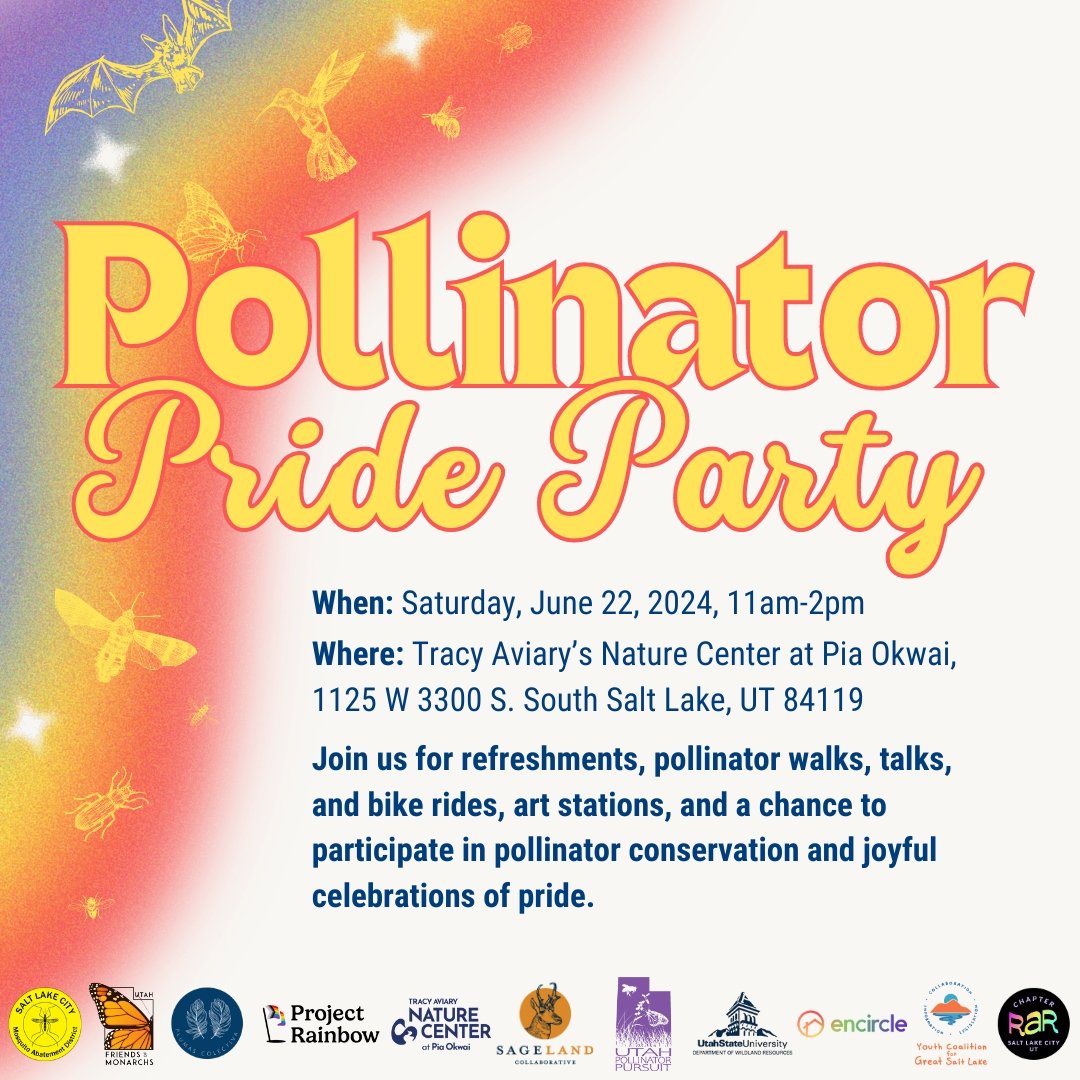
Pollinator Pride Party
We're excited to join our partners at Tracy Aviary’s Nature Center at Pia Okwai to host a Pollinator Pride Party for LGBTQ+ folks and allies in celebration of Pride Month and National Pollinator Week!
Join us for refreshments, pollinator walks, talks and bike rides, art stations, and a chance to join pollinator conservation and joyful celebrations of pride.
RAR Salt Lake City will be hosting a Pollinator Bike Ride leaving from the Nature Center at 10am, and Pollinator Walks & Talks will take place every half hour starting at 11:30am. All other activities will be ongoing throughout the event.
The party will take place at Tracy Aviary’s Nature Center at Pia Okwai at 1125 W 3300 S, South Salt Lake, UT.

Pollinator Office Hours - Liberty Park
Are you curious about pollinators? Interested in participating in conservation efforts here in Utah? Unsure how to get started?
Introducing - Pollinator Office Hours!
During these events, our pollinator experts and enthusiasts will be located at pollinator hotspots across the Salt Lake Valley for anyone who wants to stop by and learn about pollinators. These are safe spaces to connect with our team, get up close and personal with the pollinators, and enjoy a relaxing moment in nature. Pollinator Office Hours are free and provide the opportunity to get your pollinator questions answered and a chance to learn how to log your observations in iNaturalist.
Nuestros expertos en polinización también hablan español para aquellos que necesiten traducción.
We will have a table set up on the sidewalk just south of the Greenhouse - stop by anytime between 4pm - 5pm to chat and engage in pollinator conservation!
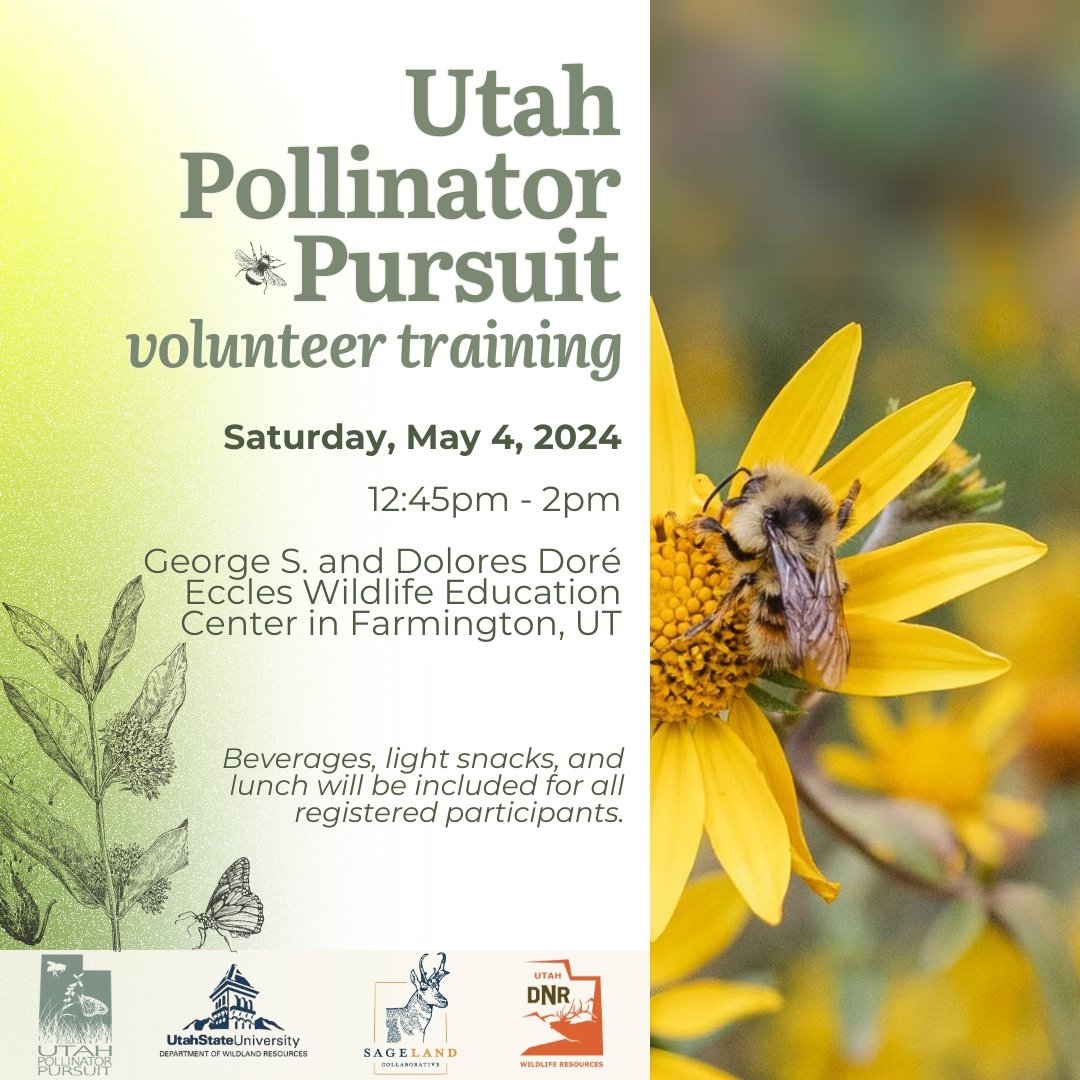
Utah Pollinator Pursuit Volunteer Training
We invite you to join us on May 4, 2024 for our upcoming project training!
Join project leads and fellow pollinator enthusiasts to dive into the importance of this work, gain in-the-field ID skills for our species of interest, and learn how to log observations in iNaturalist. Beverages, light snacks, and lunch will be included for all registered participants.
The training will be hosted on Saturday, May 4, 2024 from 12:45pm-2pm at the George S. and Dolores Doré Eccles Wildlife Education Center in Farmington, UT.
Please don't hesitate to reach out with any questions about accessibility or accommodation requests.
Sign-ups for our volunteer training day close on April 24th, so if you haven't had a chance to sign up yet, please take a moment to do so now!
Unable to attend in person? That's okay! Training videos and resources will be available on the project page following the event.
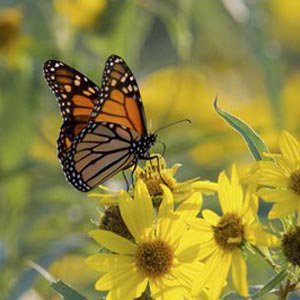
Saving the Monarchy: One Milkweed at a Time
The monarch butterfly has recently been getting a lot of attention. The population west of the Rocky Mountains has declined 99.9% since the numbers have been tracked in the 1980s. In December 2020, the monarch was declared an official candidate for the Endangered Species Act, where it is awaiting resources to help protect the species. You might be wondering how to help, and you came to the right place!
Individuals across the US are stepping up and adding monarch breeding habitat to their yards, referred to as “monarch waystations”, to provide both the milkweed and nectar sources required to keep a healthy Monarch population. Become a “citizen scientist” and join the effort!
Join local monarch expert, Rachel Taylor, to learn about the current state of the monarch, their lifecycle and migration, and why milkweed is so critical to their survival. You will receive native milkweed seeds and learn how to grow a few of Utah’s 15 native species, and how to complement them with nectar producing flowers which bloom from June to September.
Event will be hosted by Red Butte Garden online via Zoom.
Cost to attend is $10 (Garden Members) or $12 (General Public).
Register at the link here.

Monarch Joint Venture Webinar: Climate, Weather, and Monarchs
Climate, Weather, and Monarchs. Presenters: Karen Oberhauser, Univ. of Wisconsin, Madison & Leslie Ries, Georgetown Univ.
Weather is a key determinant of monarch numbers, but the story is complicated and interesting. Join us to learn the latest on what we know about monarch population drivers, in the past, present, and future.

Monarch Joint Venture Webinar: Monarch Monitoring Blitz
The International Monarch Monitoring Blitz: A New North American Tradition for Monarch Conservation. Presenter: Alessandro Diene, Insectarium of Montréal.
The “Blitz” recently celebrated its 5th anniversary with over 10,000 observations of monarchs and milkweed across Canada, the U.S. and Mexico. This webinar presents the origins, present moment, and future plans of this trinational effort.

Monarch Joint Venture Webinar: Rapid-fire Research
Get up to speed on the latest monarch and pollinator research with Jennifer and Laura from the MJV science team. The Monarch Research Review is a volunteer-driven, annual compendium of published articles available to everyone on the MJV website. Webinars are first come, first served, with a capacity of 500.
he Monarch Research Review is a volunteer-driven, annual compendium of published articles available to everyone on the MJV website. Webinars are first come, first served, with a capacity of 500.








